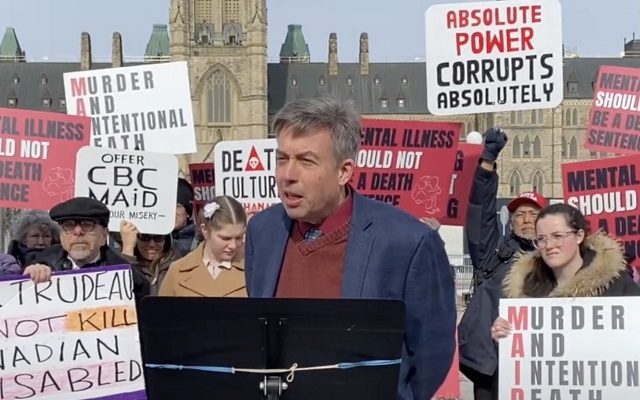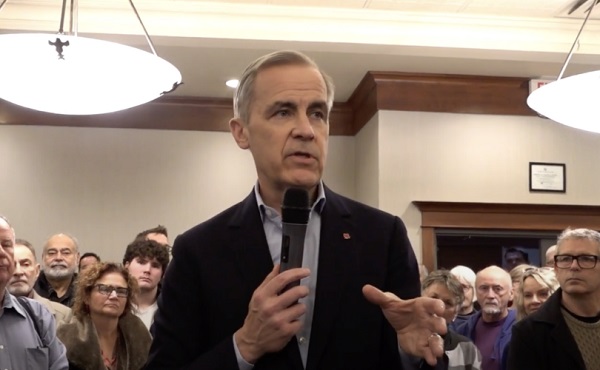MAiD
Canadian pro-life groups hold rally on Parliament Hill to protest euthanasia for mental illness

From LifeSiteNews
‘The implementation of euthanasia for the mentally ill must not simply be delayed for three years, it must be entirely stopped,’ Campaign Life Coalition national president Jeff Gunnarson said.
A number of top pro-life groups, including Campaign Life Coalition (CLC), held a rally on Parliament Hill in Ottawa Tuesday to call for protection of the mentally ill from Prime Minister Justin Trudeau’s euthanasia regime.
On February 27, CLC joined Euthanasia Prevention Coalition (EPC) and Quebec Life Coalition along with other legal and medical experts to demand that Prime Minister Justin Trudeau permanently pause the expansion of MAiD (Medical Assistance in Dying) to the mentally ill.
“While we accept this delay, the fact is that euthanasia solely on the grounds of mental illness should never have been legally permitted in the first place,” said CLC national president Jeff Gunnarson in a press release. “Those suffering from mental illness need compassionate care, not killing.”
We co-hosted a rally today on Parliament Hill. It was about protecting the mentally ill from MAiD. Thanks to all who participated.
View entire rally with all speakers here: https://t.co/KGmfVzGV8Z@EuthanasiaPC @ARPACanada @CQV_QLC pic.twitter.com/o1jXUU2mj5— Campaign Life Coalition (@CampaignLife) February 28, 2024
“The implementation of euthanasia for the mentally ill must not simply be delayed for three years, it must be entirely stopped,” he added.
During the rally, Dr. Paul Saba urged Canadians to oppose MAiD, arguing “we should be providing better care and not be killing the disabled.”
Similarly, human rights lawyer Garifalia Milousis condemned the MAiD laws, revealing that she was “here today because thankfully in my moment of suffering no one came to me and said ‘maybe assisted suicide is the solution.’”
Milousis warned that if the MAiD laws are expanded, “someone like myself in a moment of deep despair and depression and psychological suffering” would be told there is no hope for them and death is the only solution.
“Instead of us coming alongside those individuals and saying that there is hope; there is meaning, and there is purpose to their lives,” she said “We’re instead going to say ‘maybe depression is right; maybe there isn’t any hope for you anymore.’”
“My hope and prayer is that our government will change course and will hear the voices of Canadian like myself and many others here today who say that we want to live in a world that says even a life with suffering is one worth living,” Milousis declared.
In January, after a lot of pushback from pro-life, medical, and mental health groups as well as most of Canada’s provinces, the federal government under Prime Minister Justin Trudeau delayed its planned expansion of MAiD to those suffering solely from mental illness from March of this year until 2027.
Shortly after, Liberal Health Minister Mark Holland announced the Trudeau government still intends to expand euthanasia to mentally ill Canadians, despite provincial health ministers requesting the measure be “indefinitely” postponed.
The provision, if and when it is implemented, will relax legislation around so-called MAiD to include those suffering solely from mental illness. This is a result of the 2021 passage of Bill C-7, which allowed the chronically ill – not just the terminally ill – to qualify for so-called doctor-assisted death.
However, many experts have warned against the MAiD expansion, including leading Canadian psychiatrist Dr. K. Sonu Gaind, who testified that the expansion of MAiD “is not so much a slippery slope as a runaway train.”
Similarly, in November, several Canadian psychiatrists warned that the country is “not ready” for the coming expansion of euthanasia to those who are mentally ill. They said that further liberalizing the procedure is not something that “society should be doing” as it could lead to deaths under a “false pretense.”
The expansion of euthanasia to those with mental illness even has the far-left New Democratic Party (NDP) concerned. Dismissing these concerns, a Trudeau Foundation fellow actually said Trudeau’s current euthanasia regime is marked by “privilege,” assuring the Canadian people that most of those being put to death are “white,” “well off,” and “highly educated.”
The most recent reports show that MAiD is the sixth highest cause of death. However, it was not listed as such in Statistics Canada’s top 10 leading causes of death from 2019 to 2022. When asked why MAiD was left off the list, the agency explained that it records the illnesses that led Canadians to choose to end their lives via euthanasia, not the actual cause of death, as the primary cause of death.
According to Health Canada, in 2022, 13,241 Canadians died by MAiD lethal injections. This accounts for 4.1 percent of all deaths in the country for that year, a 31.2 percent increase from 2021.
While the numbers for 2023 have yet to be released, all indications point to a situation even more grim than 2022.
Carbon Tax
Mark Carney has history of supporting CBDCs, endorsed Freedom Convoy crackdown

From LifeSiteNews
Carney also said last week that he is willing to use all government powers, including “emergency powers,” to enforce his energy plan if elected prime minister.
World Economic Forum-linked Liberal Party leadership frontrunner Mark Carney has a history of supporting central bank digital currencies, and in 2022 supported “choking off the money” donated to the Freedom Convoy.
In his 2021 book Value(s), Carney said that the “future of money” is a “central bank stablecoin, known as a central bank digital currency or CBDC.”
He noted in his book that such a currency would be similar to current cryptocurrencies such as Bitcoin, but without the private nature afforded to it by its decentralization.
“It is simply untenable in democracies that the core of the monetary system could be based on forms of electronic private money whose creators control large blocks of the currency, like Bitcoin,” he wrote. “Cryptocurrencies are not the future of money.”
Carney noted that a CBDC, if “properly designed,” could serve “all the functions to which private cryptocurrencies and stablecoins aspire while addressing the fundamental legal and governance issues that will, in time, undermine those alternatives.”
Expanding on his worldview in relation to CBDCs, Carney suggested that “fear” can be taken advantage of to shape the future of money.
“With fear on the march, people were willing to surrender to Hobbes’ ‘Leviathan’ such basic rights as the freedom to leave their homes,” he wrote. “And so it is with money. People will support the delegation to independent central banks of the tough decisions that are necessary to maintain the value of money provided the authorities deliver monetary and financial stability.”
Some Canadians are alarmed by the prospect of CBDCs, a fear that only worsened after the Liberals under Prime Minister Justin Trudeau froze hundreds of bank accounts it deemed were importantly linked to the 2022 Freedom Convoy.
During the Freedom Convoy, Carney wrote in an op-ed for the Globe and Mail, “Those who are still helping to extend this occupation must be identified and punished to the full force of the law,” adding that “Drawing the line means choking off the money that financed this occupation.”
Carney is a former head of the Bank of Canada and Bank of England. His ties to globalist groups have led to Conservative Party leader Pierre Poilievre calling him the World Economic Forum’s “golden boy.”
In addition to his comments on CBDCs, Carney has a history of promoting anti-life and anti-family agendas, including abortion and LGBT-related efforts. He has also previously endorsed the carbon tax and even criticized Trudeau when the tax was exempted from home heating oil to reduce costs for some Canadians.
Carney also said last week that he is willing to use all government powers, including “emergency powers,” to enforce his energy plan if elected prime minister.
The Liberal Party of Canada will choose its next leader, who will automatically become prime minister, on March 9, after Prime Minister Justin Trudeau announced that he plans to step down as Liberal Party leader once a new leader has been chosen.
In contrast to Carney, Poilievre has promised that if he is elected prime minister, he would stop any implementation of a “digital currency” or a compulsory “digital ID” system.
When it comes to a digital Canadian dollar, the Bank of Canada found that Canadians are very wary of a government-backed digital currency, concluding that a “significant number” of citizens would resist the implementation of such a system.
MAiD
Nearly half of non-terminally ill Canadians who choose euthanasia say they are lonely

From LifeSiteNews
Of the 662 people who were not in danger of death but succumbed to medical assistance in dying last year, 47.1 percent cited as reasons for wanting to die ‘isolation or loneliness.’
Official government data shows that about half of Canadians who are not terminally ill yet wanted to end their lives via state-sanctioned assisted suicide did so last year because they said they were lonely.
According to data published by Health Canada on December 11 in its fifth annual report on medical assistance in dying (MAID), 15,342 people were approved for and died by euthanasia in 2023.
A total of 14,721 of these deaths were in cases where illness or disability were likely down the road or considered “reasonably foreseeable.” These are called Track 1 MAiD deaths.
However, 662 deaths were people who were not dying. Of these Track 2 deaths, 47.1 percent cited as reasons for wanting to die “isolation or loneliness.” By comparison, about 21.1 percent of Track 1 deaths reported the same feelings for wanting to die by doctor-led suicide.
The report stated that “social isolation and loneliness are shown to have a serious impact on physical and mental health, quality of life, and longevity.”
Of the Track 2 deaths, 35.7 percent lived alone, compared with 30.2 percent of Track 1 deaths. Of Track 1 deaths, the average age was 77.7 years. The average age of Track 2 deaths was 75.
Of note is that this year’s Health Canada report on MAiD is the first to include so-called “verbal” requests from individuals as official. Previously, those who wanted to die via assisted suicide had to submit a form to Health Canada in order to be officially recorded as a request to die by suicide.
Under Prime Minister Justin Trudeau, whose Liberal government legalized MAiD in 2016, the deadly program has continued to relax its rules on who is eligible for death.
As reported by LifeSiteNews, 1 in 20 Canadian deaths in 2023 came from assisted suicide.
Instances of people being offered MAiD as a solution to their health issues have become commonplace in Canada, as reported by LifeSiteNews.
Last week, LifeSiteNews reported how a senior Canadian couple said that a hospice care center presented euthanasia to one of them as an option because they could not afford increased care costs on their fixed income.
Canadian pro-life leaders have criticized the Trudeau government’s continued push for expanding MAiD.
Indeed, most Canadians fear the nation’s euthanasia regime unfairly targets those who are financially and socially vulnerable while still supporting the immoral practice in general.
In 2021, the program expanded from killing only terminally ill patients to allowing the chronically ill to qualify. Since then, the government has sought to include those suffering solely from mental illness.
The number of Canadians killed by lethal injection under the nation’s MAiD program since 2016 stands at close to 65,000, with an estimated 16,000 deaths in 2023 alone. Many fear that because the official statistics are manipulated the number may be even higher.
Canada had approximately 15,280 euthanasia deaths in 2023.
-

 2025 Federal Election2 days ago
2025 Federal Election2 days agoPoilievre To Create ‘Canada First’ National Energy Corridor
-

 2025 Federal Election2 days ago
2025 Federal Election2 days agoJoe Tay Says He Contacted RCMP for Protection, Demands Carney Fire MP Over “Bounty” Remark
-

 2025 Federal Election2 days ago
2025 Federal Election2 days agoHong Kong-Canadian Groups Demand PM Carney Drop Liberal Candidate Over “Bounty” Remark Supporting CCP Repression
-

 Daily Caller1 day ago
Daily Caller1 day agoBiden Administration Was Secretly More Involved In Ukraine Than It Let On, Investigation Reveals
-

 2025 Federal Election1 day ago
2025 Federal Election1 day agoLondon-Based Human Rights Group Urges RCMP to Investigate Liberal MP for Possible Counselling of Kidnapping
-

 2025 Federal Election1 day ago
2025 Federal Election1 day agoPoilievre, Conservatives receive election endorsement from large Canadian trade union
-

 Business1 day ago
Business1 day agoBiden’s Greenhouse Gas ‘Greendoggle’ Slush Fund Is Unraveling
-

 Business1 day ago
Business1 day agoTrump says ‘nicer,’ ‘kinder’ tariffs will generate federal revenue








